Ask Paper Doll: How And Where Can I Donate Lots of Books?
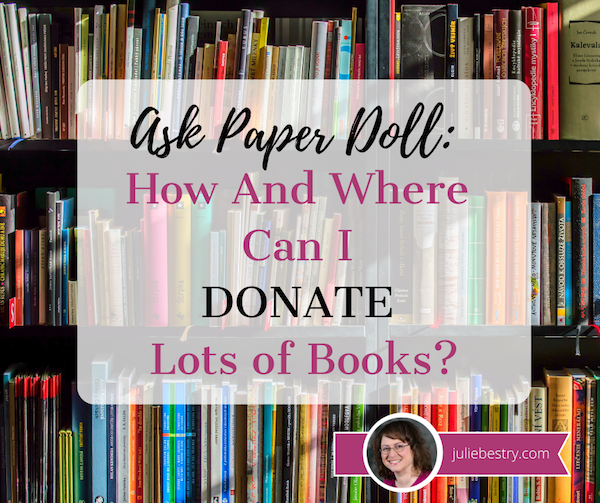
This is the first in a recurring series of Ask Paper Doll posts where you can get your burning organizing questions answered by Paper Doll, a 20-year veteran professional organizer and amateur goofball.
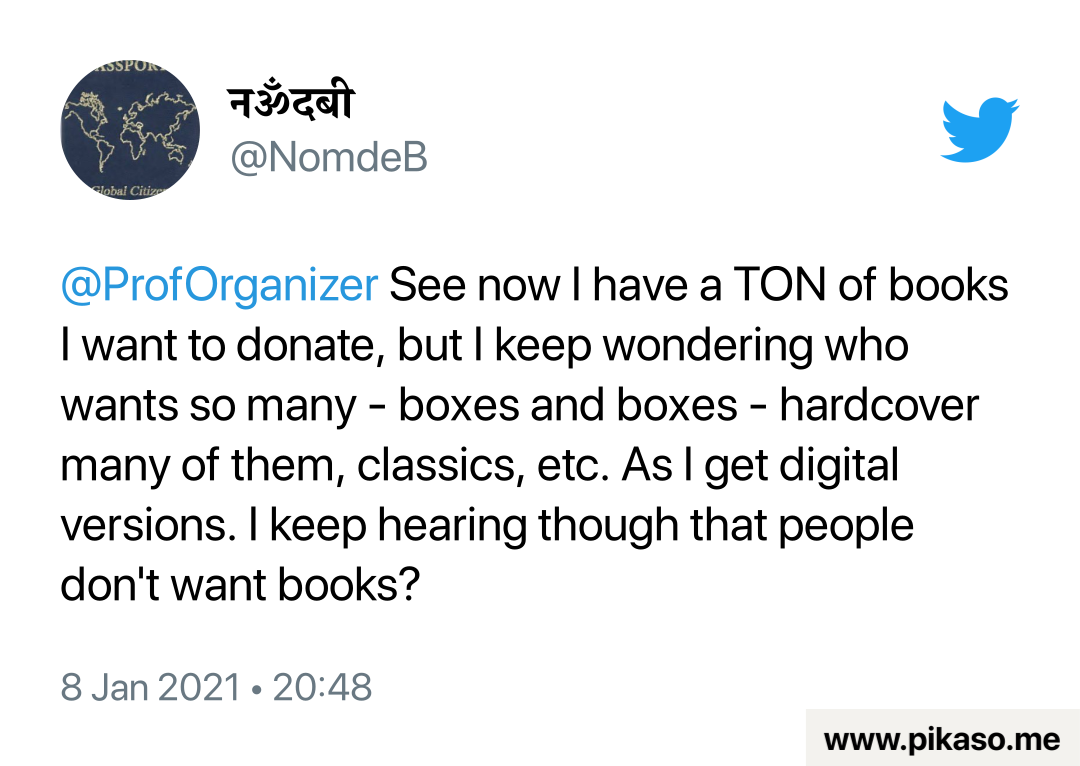
Dear @NomdeB,
These are actually three (excellent) questions! The first, implied, is the bulk of what will address today: where and how can we donate a largesse of books? The second, “Who wants so many?” is partly answered along with the first, but the truth is that if you have a huge book collection (and it appears that you do), you’ll probably be making donations to multiple venues.
But the question at the end of your tweet deserves a bit of attention.
PRINT BOOKS VS. DIGITAL
Do people still want real, tangible books?
And, at the risk of sounding like I’m saying, “Yes, Virginia, there is a Santa Claus,” yes, @nomdeB, people do still want, and read, real books. At the very least, in the United States, even in an era where all-things-digital are the rage, physical books still outsell ebooks. Statistics from 2020 have not fully been reviewed, but in the prior year, the U.S. book industry had $26 billion in revenue; $22.6 billion of that was for print books and only $2.04 billion in digital books. (The rest, one imagines, are in audio books, braille, and rarer, specialized formats.)
[Editor’s note: After publication of this post, results were released showing that print book sales rose 8.2% in 2020, the largest annual increase since 2010!]
It seems the death of the printed book has been greatly exaggerated. There’s some academic research as to why many people (like myself) still prefer tangible books. For example, one study found that print books had the edge over print when it comes to greater reading comprehension and lesser eye fatigue. Further anecdotal evidence indicates that people appreciate the tactile sensation of progress as you get further along in a print book. And I’d be remiss if I didn’t share findings from my alma mater, Cornell University, which has found that “both users and non-users of e-books generally preferred using printed versions of textbooks.” (I hope it’s not just because you can satisfying slam a textbook when you can’t understand what you’re reading!)
People like to read, and people who like to read have a fondness for books they can hold in their hands, show off on the subway, bookmark and annotate easily, and display in their homes to impress their beaus or in their offices to impress their bosses. A book is not just the content of what is written inside, but what it allows one to feel upon seeing the cover, and what we hope it says about ourselves. Books, like people, are complicated.
With that concern dispensed of, let’s move on to what to do when you’re simply ready to let go of the excess – the books you’ve already read and won’t read again, the books you’ve outgrown, and the books you never read, either because they were ill-fitting gifts or you acquired them for aspirational rather than practical purposes and you’re finally, finally giving up trying to read them. (Hello, Moby Dick?)
YOUR BOOKS
@nomdeB, you’re not kidding about having a ton of books.
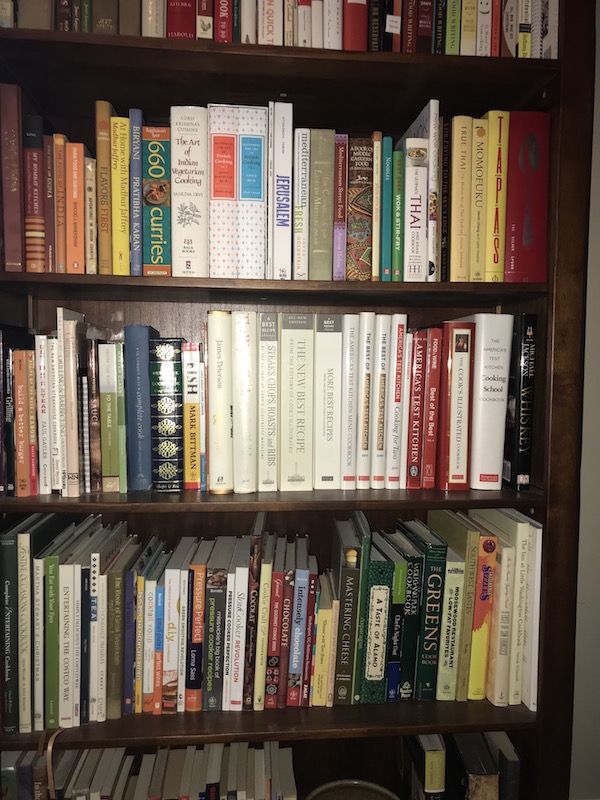
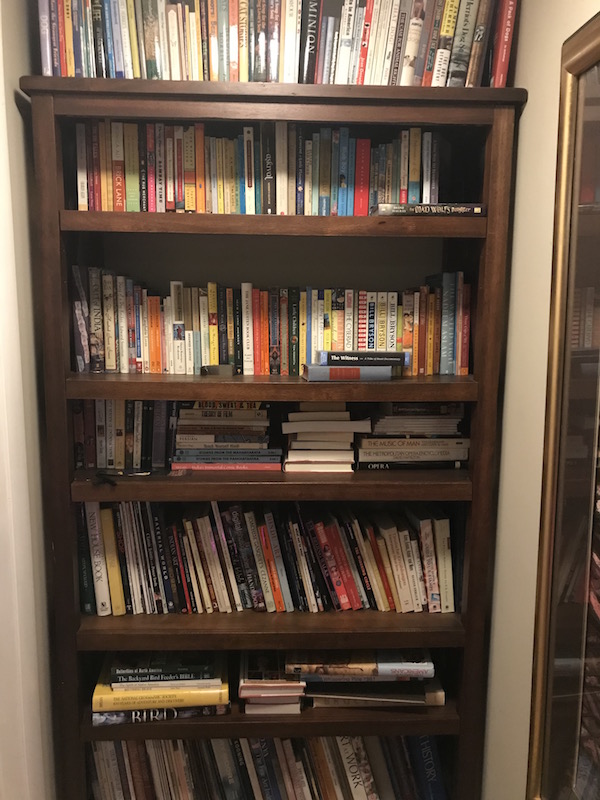
From the photos you showed me, you do, indeed, have a wide variety of books, both on bookshelves and in boxes, and they are almost all perfectly categorized into genres. (Though I do wonder how Hemingway and Thomas Hardy got blended with Geological Hazards.)
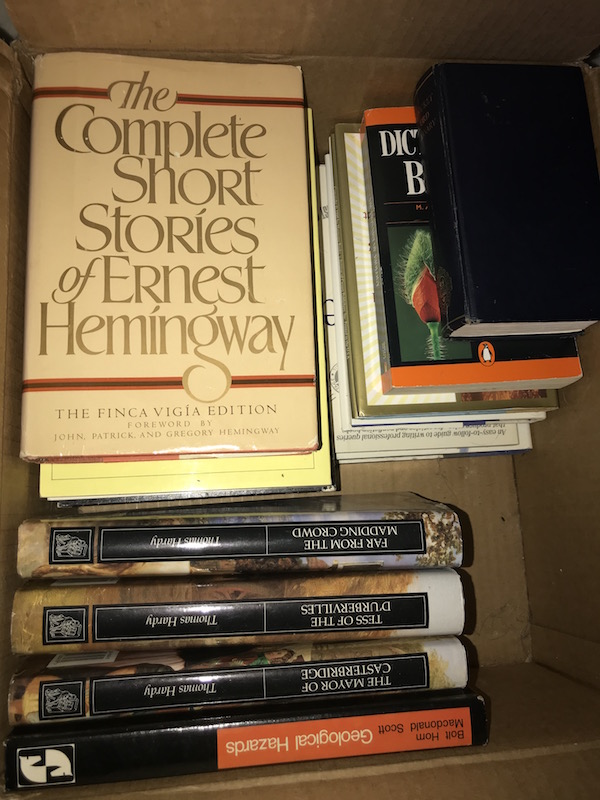
From Harry Potter to Mario Puzo, from 660 Curries to Puppies for Dummies, from C.S. Lewis to a Hindi-English/English-Hindi dictionary, you could open up your own bookstore or lending library. (Though I’d be glad to take that Short Walks in English Towns off your hands.)
DONATE YOUR BOOK TO CHARITIES
We’ll begin with a bevy of traditional charities that accept donations of books. As you’ll see further along, this is not the only option, but it’s where most people start. You probably already have some favorite charities, like Goodwill or Vietnam Veterans of America, but if you’d like to look further afield, consider the following.
Donate Books to Members of the Military — Did you know that the surge in popularity of paperback books actually began in World War II, with the creation of publishing arms dedicated to printing smaller, lighter books? (It helps that the proliferation of book-burning by the enemy helped make the reading of books an almost patriotic activity!) If you’d like to read more about this era, Molly Guptill Manning’s When Books Went to War: The Stories That Helped Us Win World War II offers great insight.
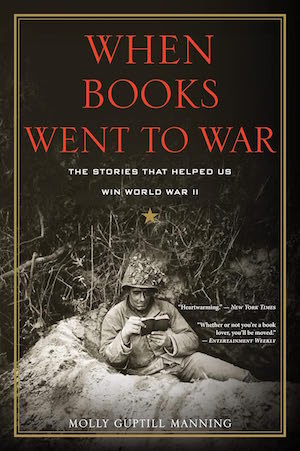
Yes, I digress, but it’s my column and I can meander if I want to! The point is that donating books to our soldiers, sailors, airmen, Marines, Coast Guardsmen, and Guardians is a worthwhile endeavor. Consider these options:
Books for Soldiers – With the motto “Care Packages for the Mind,” Books for Soldiers lets any deployed member of the military request a book (or DVD, or video game). Donors can view book requests, and you send books directly to the troops rather than to a central repository.
Operation Paperback – Through a network of volunteer shippers (that is, donors) around the country, this non-profit lets you input the genres you have and OP’s system will generate a customized address list to which to send books. Operation Paperback also provides books to wounded warrior programs and veterans hospitals in the U.S., as well as USO centers at US Airport transit points.
Donate Books to Prisoners – Education is a key to rehabilitation, which is essential for inhibiting recidivism. In recent years, many prisons have curtailed the ability of prisoners to accept books. During COVID, many prisons are in lockdown, leaving few opportunities for human interaction. Most prisons do not not allow friends or family members to send books directly to prisoners, so only bookstores, online stores, publishers, and donation programs can get books into the hands of prisoners. Each organization has a list of requested genres and items they cannot accept. Please read them carefully, and note that in all cases, dictionaries are highly desirable.
Prison Book Program – In addition to general reading for entertainment, escape (no pun intended) and self-education, they have special programs for disseminating GED study guides, legal books, and dictionaries. Prisoners write essays and reviews of the books they’ve read. Due to COVID, they are not currently taking donations by mail and limiting in-person donations. Please keep an eye on their donation information page as we (hopefully) exit the pandemic.
DC Books to Prisons – This organization accepts English- and Spanish-language paperbacks. Due to COVID, they aren’t currently accepting donations at their usual location, but their volunteers are meeting donors by appointment. The link I’ve provided indicates the genres and titles (both fiction and non-fiction) most desired.
Books Through Bars – This group sends books to prisoners via their offices in New York City, Philadelphia, and Boston.
SATURDAY AND SUNDAY—> Mass-Market paperback drive!
We are in need of the following mass-market paperback fiction*:
* Mystery/Detective (e.g. Sue Grafton, Barbara Neely, Lee Child)
* Thrillers/Action (e.g. P.D. James, James Patterson, Patricia
Cornwell, Clive Cussler) pic.twitter.com/xBWpUasUi5— NYC Books Through Bars (@BtBsNYC) January 16, 2021
Books to Prisoners – This Seattle-based nonprofit mails free books to incarcerated person across the U.S. Operations are currently closed due to COVID, but please keep this option bookmarked for future consideration.
Inside Books Project – This group sends more than 35,000 books to incarcerated Texans each year.
Women’s Book Project – Mail books or donate locally in Minneapolis.
Donate Books to the Wider World – Both at home and abroad, books are heartily desired to build collections in libraries and schools and to be sold so profits can support literacy programs. (The following primarily seek adult books; a future post will cover donations of children’s titles, as the requirements tend to be complex and geographically-specific.)
Better World Books – Simply box up your books, print a shipping label (the cost of which is covered by BWB) and ship to their facilities in Indiana. The books will either be resold to raise money for literacy charities or donated to a child in need, as appropriate. They also have drop boxes in a variety of cities; just enter your community in the search map. (You can also buy used books from their site to help them raise money for their literacy causes.)
Books for Africa – This group seeks paperbacks and hardcovers published in the past 15 years, textbooks, and reference books (including medical and IT/computer books) from the last ten years. Over the past 23 years, they’ve shipped millions of books to children and adults in 46 countries. Donation dropoffs are available in Atlanta, GA and St. Paul, MN. See their requirements.
Open World Books – This Chicago-based 501(c)3 nonprofit accepts donations at their headquarters and at donation drop-boxes around the city, allowing for 24/7 contactless donation. They operate a used bookstore, the proceeds for which fund literacy programs for children and young adults.
Books 4 Cause – Book donations to the Chicago-based Books 4 Cause have helped create 118 libraries in Africa, recirculated hundreds of thousands of books, and saved even more from landfills. Their campus book drives have collected textbooks for developing libraries and supported educational programs in Africa. In addition, donated books for children and adults have been distributed to people in need in Chicago and worldwide. Donations are accepted in Chicago and New York City.
And remember, if you don’t want to even leave your house, Give Back Box is an easy option for getting books donated and on their way with minimal effort and at no cost to you.
DONATE IN YOUR COMMUNITY
While the above non-profits are meaningful, many donors prefer to give their books new lives in the communities where they live. The following donation solutions will differ from community to community and venue to venue. Take an extra few minutes to check out the venues and make calls to each to see what the genre requirements and preferences are, and what, if any, special donation rules exist during COVID.
Retirement homes – If you’ve ever visited a friend or relative in a retirement community or assisted living center, you may have noticed how anemic the “library,” if there is one, seems. A mere smattering of bound Reader’s Digest Condensed Books is heartbreaking to an eager reader. While large print books may be the most appealing for some, lifelong readers love to read and will welcome a wide variety of genres.
Think “old folks” just want classics or naval war histories? Get real. Remember, folks born 90 years ago were just in their 30s in the swinging 60s. My 96-year-old friend watches Grey’s Anatomy and keeps up with the same shows I do. Age is no barrier to reading tastes. If you like a book, someone twice (or even thrice) your age may like it, too!
Age is no barrier to reading tastes. If you like a book, someone twice (or even thrice) your age may like it, too! Share on XHospitals, especially children’s hospitals and veterans’ hospitals – During COVID, patients can’t have their loved ones with them. Many hospitals have terrible Wi-Fi and books offer a rare comfort. And even in “normal” times (remember those?), patients and parents of children often seek something to occupy their minds and time. Call the volunteer director of your local hospital(s) and ask if they have a patient/family lending library and if they are accepting donations.
Ronald McDonald Houses – Across the country, Ronald McDonald Houses offer home-away-from-home respites to families of sick children so they can live close to the hospital during treatment. Not all RM Houses accept used books, though, so call your local RMHC chapter or program house and ask whether they have a library to which you can donate. If you’ve got a TON of books, as @NomdeB has, you might be able to help them create an entire library from scratch!
Homeless shelters – Unhoused people lose so much of the dignity of their former lives; a home is not merely a place in which to live, but it’s a space in which to seek refuge. Books are a place in which to seek mental and emotional refuge. While space is likely to be limited at homeless shelters, it’s worth calling to ask if they have a library area in the building and if they are able and willing to accept donations. (If it’s within your power, you might also want to donate bookshelves.)
Domestic violence shelters – The strength it takes to escape a violent household and build a new life for yourself (and possibly your children) is immense. Emotional reserves of strength can be fortified by education, entertainment, and motivation – all attributes to be found in books. As above, call to see if donations are accepted.
Local professional, community, and high school theaters – When you go to the theater, you probably pay the most attention to the actors, but good sets create an ambiance. Check with your local theaters to see if they would like donations of books, particularly hardcovers to line the shelves of sets for spaces like attorney’s offices or fancy-pants rich people’s home libraries.
Libraries – Although libraries have limited budgets, many public library systems have rules regarding what they can accept for circulation. However, if your community has a Friends of the Library organization, it’s likely that there’s some sort of annual library book sale to which your books can be donated.
Additionally, the American Library Association helps American and international libraries after natural disasters. In general, financial aid is sought, but there are often needs for books, particularly children’s books, when library collections are destroyed. Your library may post requests on your branch web site, so it’s great to get in the habit of visiting your public library’s site to keep abreast of such needs. Also, check out the ever-changing tabs at the ALA’s Book Donation Programs site.
School libraries and academic departments – While public libraries may not be allowed to expand their collections with donations, many public schools, particularly in disadvantaged communities, might find your books a boon. If the middle or high school has a home economics department (do schools still teach Home Ec?), those cookbooks of yours could be a delight!
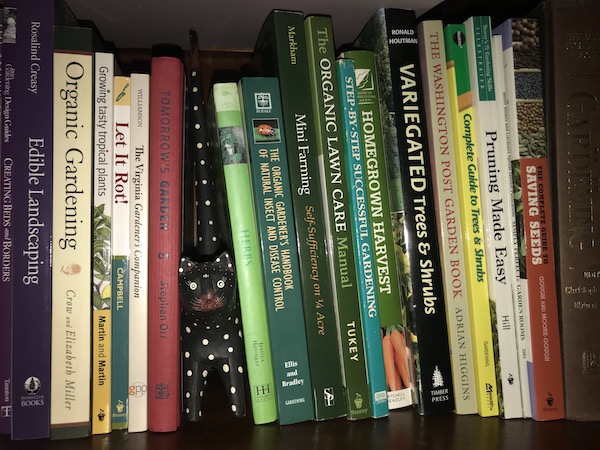
Homeowners Association Clubhouses and Community Centers – @nomdeB, all those gardening books would be a boon to people in a starter home who have never had their own garden. A quick call to an HOA or community center (sometimes found in houses of worship in smaller communities) could find a great home for your how-to and DIY books!
BUILD YOUR OWN LENDING LIBRARY
One of the greatest book-related charms over the past decade has been the growth of the Little Free Library movement. Their website provides all the information you need to start your own lending library program from right outside your own home. Build your library, register it, and trust that the right people will find their perfect reads.
@nomdeB, thank you for asking the first Ask Paper Doll question, and I hope this helps you find homes for your gorgeous collection of books.
Readers, if you have a favorite option for donating books, I encourage you to share in the comments. And, as always, feel free to reach out through social media or my site’s Contact page to contribute your own Ask Paper Doll question.




I always say that books are the ultimate “reusable.” I know some people (ahem, my daughter) who collect them, but often they just pile up. Even in the age of digital readers, many still prefer a paper book. I love giving my eyes a break from a screen. Also, there is the beauty of books on a shelf, the smell of a physical book, and the ability to refer back to them. Still, they take up space, so we should only keep our favorites or those we know we will read. I appreciate the thorough list of options for donating. So many people actually want them. I help support a school in Africa and they want them. Our biggest hurdle is physically getting them there. If you donate to a charity who is shipping the books, it always helps to donate a bit of $$ to help pay for the shipping.
Thank you for making that important point, Seana. Shipping is always an extra burden for non-local charities, and anything we can do to help is going to be advantageous.
First of all, congratulations on your inaugural edition of “Ask Paper Doll!” You chose an excellent topic that is a huge question for so many people. I LOVE all of the resources you shared and will definitely refer back to this post.
I was happy to hear the stats that the death of physical books is nowhere in sight. While I’m a fan of my computer and tablet for a lot of digital communication and work, I prefer good old paper books when I read. I love to highlight things and enjoy the physical properties of touching books. Plus, it gives my mind and eyes a break from the screens.
Several years ago, when I cleared out and prepared my parent’s home for sale, one of the categories I had to work on was the massive collection of books. They had thousands of books- beautiful books. The family took what they wanted, and I was able to sell some. But the rest was donated. My mom wanted them to go to their local library. However, when I talked with them, they would only accept 20 books at a time. It would have taken years to make that happen. I found another local library that was willing to take everything, including their LP collection.
Thank you, Linda. I think @nomdeB’s question was perfect for this, too. She’s a great inspiration. I was only sad that many of the smaller charitable resources I’ve recommended in the past have had to cease their efforts during COVID.
And yes, I’m a “real” book person; I completely believe the research that says reading comprehension from paper texts is increased (vs. digital), even if it’s only true for those of us who are pre-digital people.
I’ll have that same book downsizing project at my childhood home. All those Churchill hardcovers!
Expanding on Julie’s mention of hospitals: Chemotherapy patients could use your books. https://jdorganizer.blogspot.com/2007/07/donations-chemotherapy-patients-could.html
Thanks, Jeri. I assumed that chemo and cancer centers were considered hospitals, but if that’s not the case (or even if it is), this is a great reminder!
You never disappoint Julie. This is packed with information. I’m going to save several of the organizations. I’ve never heard of many. You surprised me with the statistics at the beginning of the post. I usually donate books to my local library, for just what you said. They have a seasonal book sale and the proceeds helps keep the library going. The main reason I donate there is that it’s super easy and the donation income stays local. Thanks for a great post.
Thanks, Janet — you know how I feel about never leaving any aspect untouched. (That is to say, I think I’m constitutionally unable to leave words out!)
And I agree, the library book sale is an easy and typical choice, but during COVID, many library book sales are on pause, so I tried to cover all the other options. I’m hoping readers will come up with unique and intriguing options in their own communities.
Thank you for reading and sharing!
Julie, your list is long and thorough. You did a great job here!
I wasn’t clear if, with Covid, the facilities are accepting
donations? Please let me know so I can share with people who ask. Someone, who has 2500 cookbooks in her home, asked me this question. And, she’s not a chef, she just likes to cook.
Thanks, Ronni. You know how I love to give a *complete* answer! 😉
As of when I finished writing the post (1/18/2021), everything is as written above. Books to Prisoners is the only one currently closed to donations. The other two limits are as I wrote above, but to be clear:
1) Prison Book Program — “Due to COVID, they are not currently taking donations by mail and limiting in-person donations.” So, you can’t mail to them, and there are limitations on how/where/when you can donate in person. Call for up-to-date in-person information.
2) DC Books to Prisons — Their regular donation location is closed for COVID, but you can call to make appointments to deliver donations to their volunteers.
Thanks for this marvelous list! I review my personal collection of books every year & always find ones that I am ready to pass along to others. My daughter recently earned a $98 store credit at McKay’s in Nashville with her extra books. I appreciated the reminder about all genres for nursing homes.
Yay for your daughter; I love McKay’s here in Chattanooga, too. A future post will cover selling books, which is more hit-and-miss proposition, but for this question on donation, the hardest part was limiting it to those available to the greatest number of people. (There were so many wonderful, but local-only non-profits accepting book donations!) Thanks for reading!
[…] to your nearest thrift store or library bookstore. If you want to explore more specific options, check out this comprehensive article on how to donate your books by my colleague Julie […]
[…] If you’re interested in learning more about any of the books I’ve mentioned, your library is a great place to start. Goodreads will give you more reader reviews. For donating options for books, refer back to my colleague Julie Bestry’s definitive article. […]